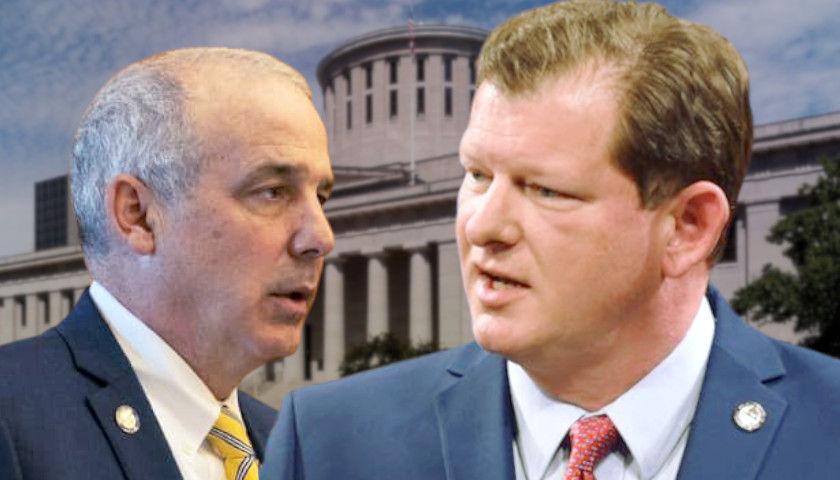Ohio House Speaker Jason Stephens (R-Kitts Hill) indicated that the state legislature may miss the deadline for the state’s biennial budget with negotiations to continue into July.
Under the Ohio Constitution, the state’s two-year budget must be passed and signed into law before the fiscal year’s end on June 30th. However, the budget legislation approved by the Ohio House and Senate differ significantly from one another.
Stephens (pictured above, right) told reporters that he anticipates that a legislative conference committee, established to resolve disputes between the house and senate budget plans, will be able to find consensus on issues like tax reductions and school funding.
The house’s $88 billion budget included greater funding for social services, daycare, K–12 schools, and food banks. It also aims to eliminate Ohio’s third-grade reading guarantee, which requires kids to repeat third-grade if they don’t pass a reading proficiency test. The budget passed with substantial bipartisan support.
The senate’s $86 billion budget increased taxpayer-funded vouchers for private schools well beyond what the house authorized, and it delivered larger tax cuts by combining the three tax bands in the house budget into two. Republicans in the senate also reduced the amount spent on social services by the house and reinstated Ohio’s third-grade reading guarantee. The senate budget passed on party lines without support from the Democrats.
According to Senate President Matt Huffman (R-Lima), it’s time to make bold changes to the state budget.
“Challenging the status quo is difficult. Now is the time to make the bold changes necessary to focus on the results our taxpayers should demand, the results our parents should expect for their children’s education, and the results our state desperately needs to revitalize crumbling neighborhoods in our city centers,” Huffman (pictured above, left) said.
An Ohio think tank, the Buckeye Institute, said that although no budget is perfect, it prefers the version the senate passed.
“No budget is perfect, and The Buckeye Institute remains concerned about the sustainability of overall spending, but the Ohio Senate wisely uses Ohio’s record surplus to put Ohio on a path to greater prosperity,” Rea S. Hederman Jr., executive director of the Economic Research Center and vice president of policy at The Buckeye Institute said.
If lawmakers cannot pass the budget by the deadline, it wouldn’t be the first time that’s happened in recent history. The last time the legislature was unable to reach a consensus on a budget by June 30th was in 2019, when it took the then-Speaker of the House Larry Householder, and the then-President of the Senate Larry Obhof until July 17th to settle disagreements on taxes, health care, and education.
To maintain governmental operations during that time, the general assembly passed a temporary budget. As a result, public agencies could not launch new initiatives, fill open positions, or grant any raises at that time. Some public universities even delayed issuing tuition invoices to students.
According to Stephens, he anticipates lawmakers will be able to pass a temporary budget until they can strike a final deal. He said he wants to make sure this budget “serves all Ohioans.”
– – –
Hannah Poling is a lead reporter at The Ohio Star and The Star News Network. Follow Hannah on Twitter @HannahPoling1. Email tips to [email protected]
Photo “Jason Stephens” by Jason Stephens. Photo “Matt Huffman” by Matt Huffman.








